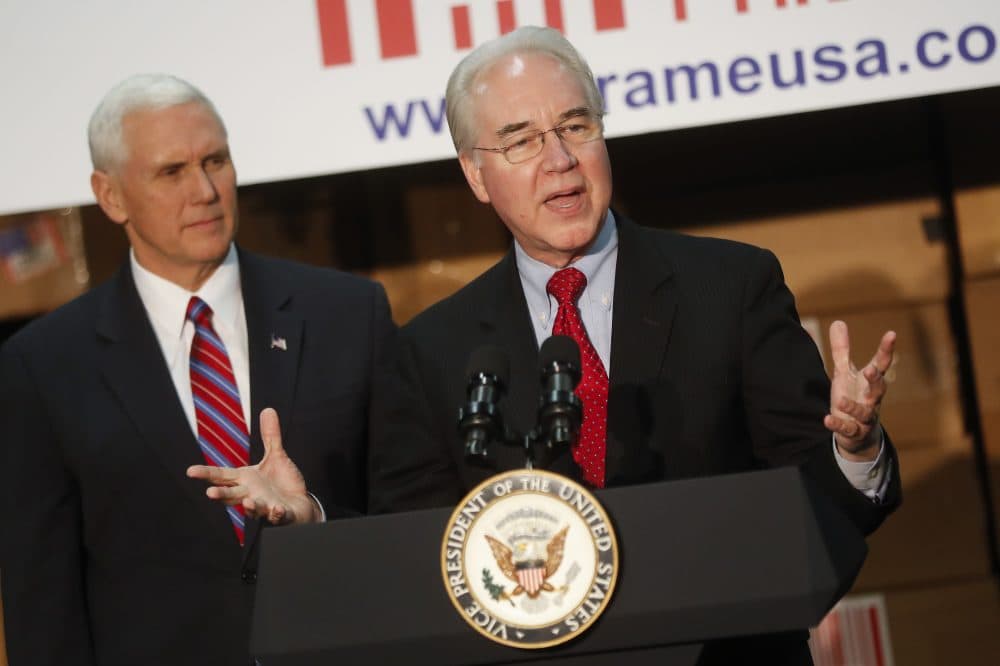Advertisement
Commentary
Dear Secretary Price: For My Dad's Sake, Protect The FDA

With federal action on health care very much in flux, CommonHealth is launching a new series, "Dear Secretary Price." The question: If you found yourself in an elevator with Dr. Tom Price, the country's new health secretary, and had only a couple of minutes to tell him your most urgent thoughts about American health care, what would you say? We're seeking a broad range of opinions and welcome submissions — though we may not be able to publish all of them — at commonhealth@wbur.org.
Dear Secretary Price,
Fourteen years ago my dad passed away at the age of 55, due to complications likely resulting from a clinical trial in which he was enrolled. He had been diagnosed with advanced prostate cancer five years earlier.
Although his first clinical trial was grueling, it was successful in keeping the cancer in check for a few years. He enrolled in a second trial, which neither helped nor harmed him. The third trial would be his last.
He suffered severe complications that caused his bone marrow to fail. Our family was unable to find a match for a bone marrow transplant, and my dad passed away from a combination of trial complications and cancer. Later, we were relieved to learn that the Food and Drug Administration had been involved in halting the trial to prevent potential harm to other patients.
As a doctor, I feel compelled to tell our family’s story now in response to the increasingly likely prospect that the FDA’s critical regulatory role will be diminished.
The FDA regulates anything we put in, or on, our bodies — from chemotherapy to eyeliner. While the recent passage of the 21st Century Cures Act contains provisions I support (increased funding for substance abuse treatment and cancer research, for example), it also weakens the FDA’s longstanding regulatory powers. The act allows the FDA to consider so-called “real-world evidence” to approve drugs, instead of the more rigorous testing through clinical trials.
Supporters of the change argue that the FDA slows down the drug development process and that the public should have the "right to try" drugs that have been proven safe, but not effective. This approach is misleading because the FDA already has a “compassionate use” process to get critically ill people access to clinical trial drugs that have not yet been approved.
Even without the “compassionate use” option, the FDA already moves drug approval along so quickly that it is faster than both its European and Canadian counterparts. But “right to try” advocates want to work around the FDA, which would potentially place the financial burden of drugs on patients, while prohibiting the FDA from collecting important data.
Very sick patients should be given access to new medications, but only in the context of a carefully administered clinical trial. This allows us to learn what works and what doesn’t more safely. In my dad’s case, he signed consent forms and our family was acutely aware of the risks involved. The FDA, along with several other regulatory bodies, closely monitored the study and his outcome.
It is vital that we continue to empower the FDA to protect patients and consumers. Rigorous evidence-based medicine, such as randomized control trials, should continue to be the gold standard for assessing safety and efficacy.
As doctors, my colleagues and I rely on the FDA to help us make decisions about which medicines are best for our patients. In my dad’s case, the FDA worked exactly as it was supposed to; the drug’s development was scrutinized and no additional lives were put at risk.
Before his death, my dad sent a letter to the principal investigators of his clinical trial. He concluded the letter with:
Your team needs to know that I have nothing but the greatest respect for their dedication, and I hope they continue to pursue the goal of controlling advanced prostate cancer. What has happened to me is only a setback if competent, committed individuals give up hope.
I have not given up hope that we will make strides against cancer and other deadly diseases. But to do this, we need the FDA to continue to guide us toward safe, efficacious and affordable treatments.
Dr. Samantha Harrington is a resident physician at the Cambridge Health Alliance.